International Business Report: WTO, Functions, and Challenges
VerifiedAdded on 2022/12/22
|14
|3970
|49
Report
AI Summary
This report provides an in-depth analysis of international business, focusing on the World Trade Organization (WTO). It begins with an executive summary and an introduction that sets the stage for understanding the complexities of global trade. The report then delves into a literature review, exploring the motivations behind the formation of the WTO, followed by an examination of its key functions, including trade dispute settlement, resource utilization, policy implementation, and strategic forums. The core of the report assesses the suitability of the WTO and the challenges it faces in encouraging international trade. It also applies relevant theories to assess the WTO's effectiveness, using examples of how specific organizations and industries are affected by WTO policies, such as the Absolute Advantage theory and its influence on companies like Tesco. The report concludes with a summary of findings and a list of references.
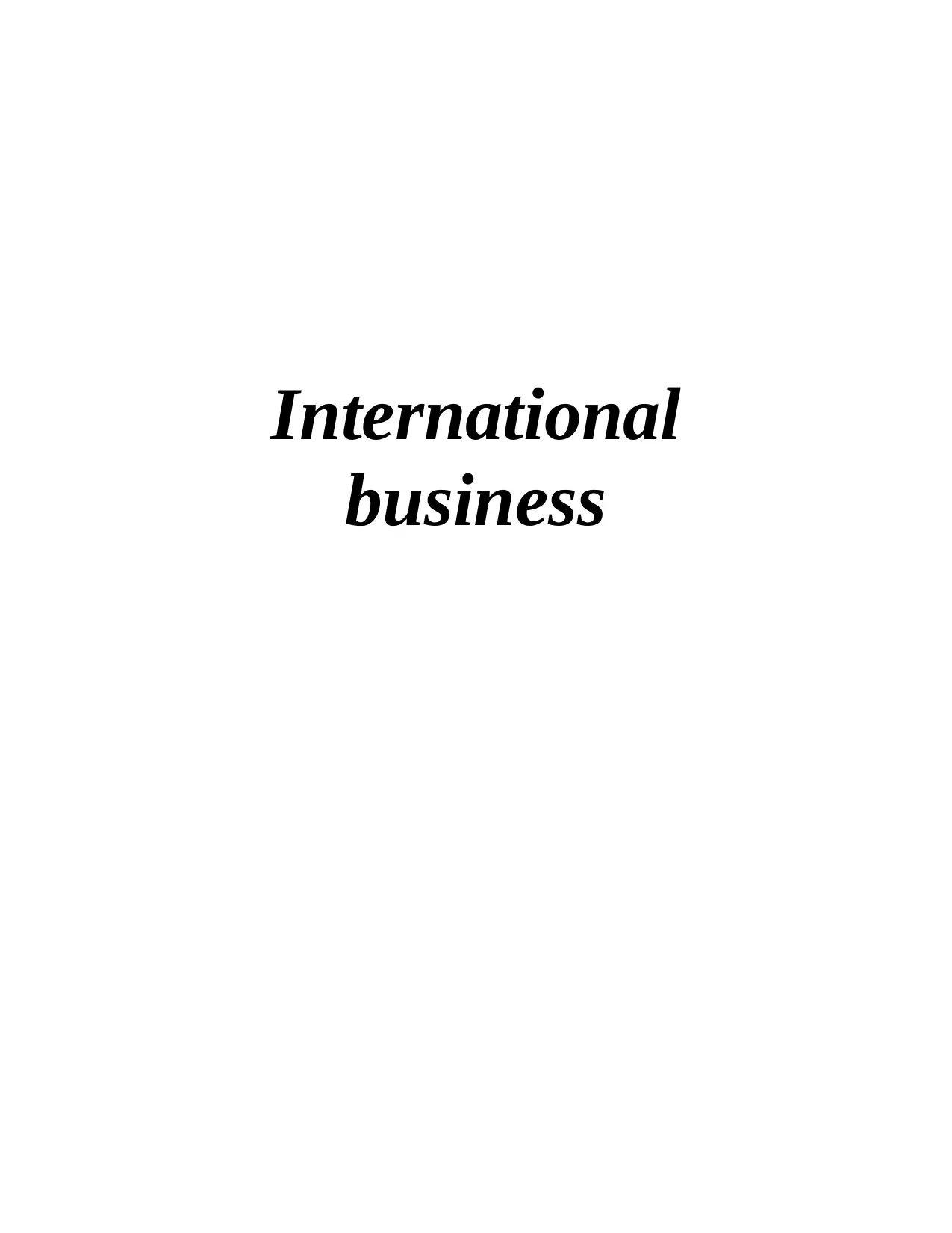
International
business
business
Paraphrase This Document
Need a fresh take? Get an instant paraphrase of this document with our AI Paraphraser
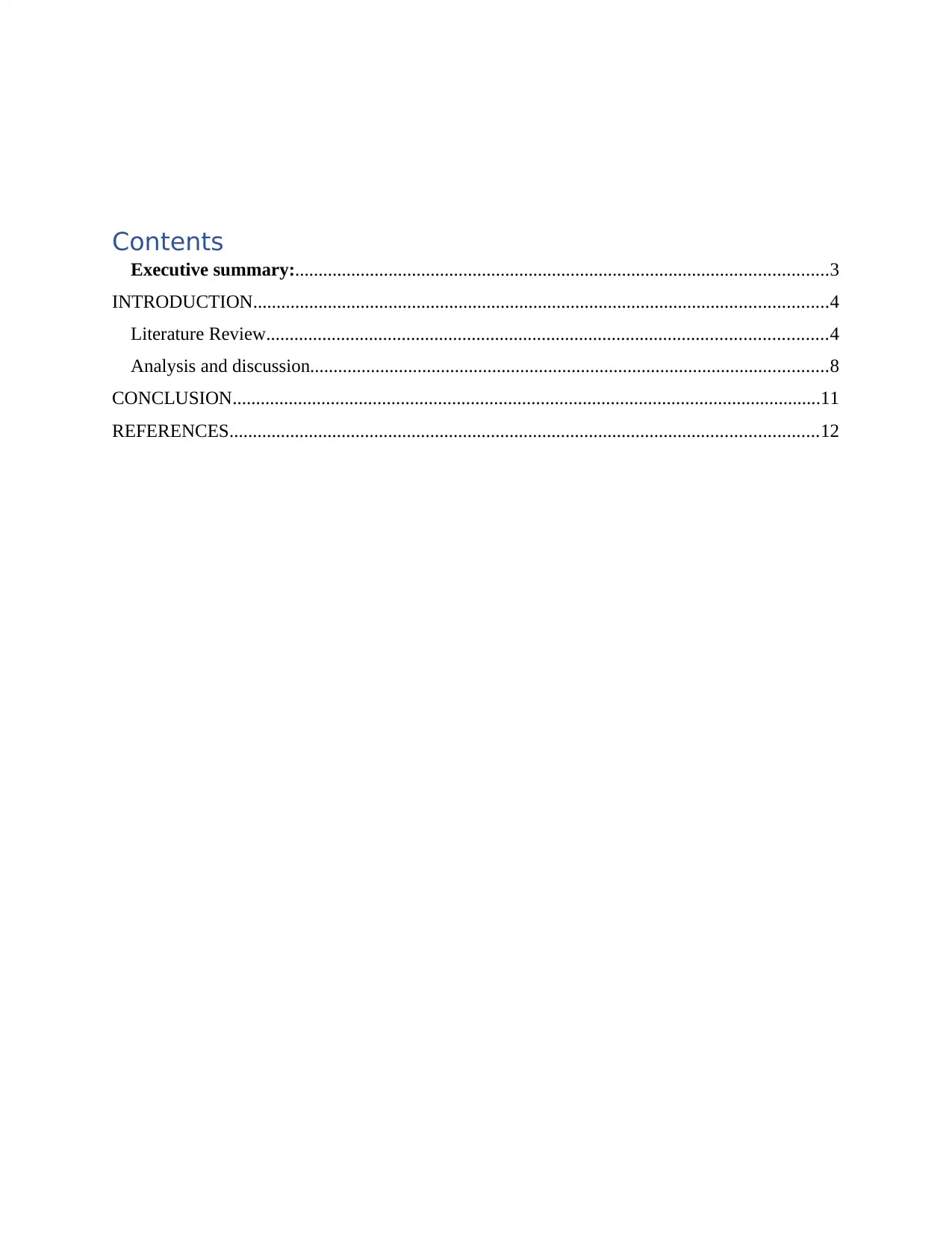
Contents
Executive summary:..................................................................................................................3
INTRODUCTION...........................................................................................................................4
Literature Review........................................................................................................................4
Analysis and discussion...............................................................................................................8
CONCLUSION..............................................................................................................................11
REFERENCES..............................................................................................................................12
Executive summary:..................................................................................................................3
INTRODUCTION...........................................................................................................................4
Literature Review........................................................................................................................4
Analysis and discussion...............................................................................................................8
CONCLUSION..............................................................................................................................11
REFERENCES..............................................................................................................................12
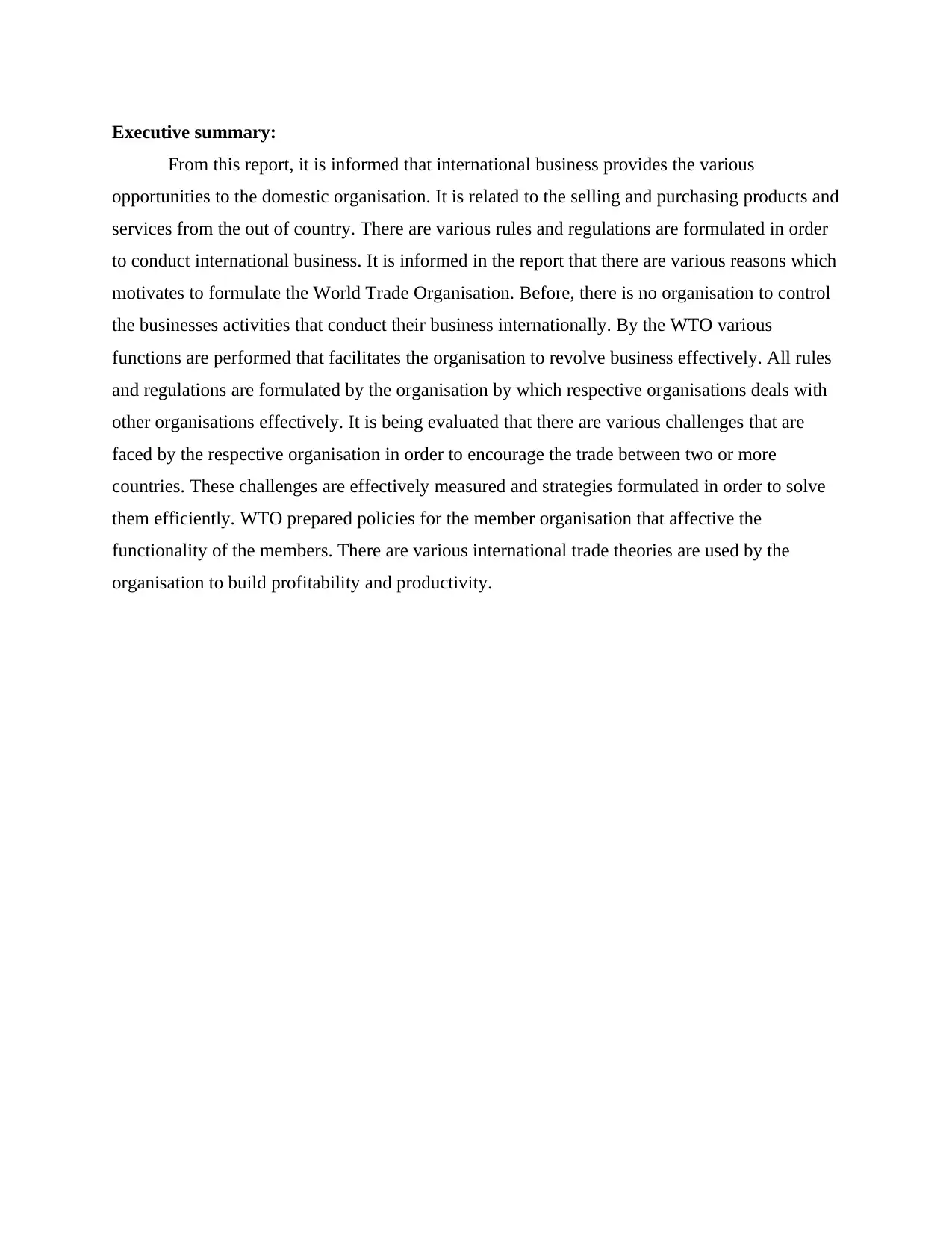
Executive summary:
From this report, it is informed that international business provides the various
opportunities to the domestic organisation. It is related to the selling and purchasing products and
services from the out of country. There are various rules and regulations are formulated in order
to conduct international business. It is informed in the report that there are various reasons which
motivates to formulate the World Trade Organisation. Before, there is no organisation to control
the businesses activities that conduct their business internationally. By the WTO various
functions are performed that facilitates the organisation to revolve business effectively. All rules
and regulations are formulated by the organisation by which respective organisations deals with
other organisations effectively. It is being evaluated that there are various challenges that are
faced by the respective organisation in order to encourage the trade between two or more
countries. These challenges are effectively measured and strategies formulated in order to solve
them efficiently. WTO prepared policies for the member organisation that affective the
functionality of the members. There are various international trade theories are used by the
organisation to build profitability and productivity.
From this report, it is informed that international business provides the various
opportunities to the domestic organisation. It is related to the selling and purchasing products and
services from the out of country. There are various rules and regulations are formulated in order
to conduct international business. It is informed in the report that there are various reasons which
motivates to formulate the World Trade Organisation. Before, there is no organisation to control
the businesses activities that conduct their business internationally. By the WTO various
functions are performed that facilitates the organisation to revolve business effectively. All rules
and regulations are formulated by the organisation by which respective organisations deals with
other organisations effectively. It is being evaluated that there are various challenges that are
faced by the respective organisation in order to encourage the trade between two or more
countries. These challenges are effectively measured and strategies formulated in order to solve
them efficiently. WTO prepared policies for the member organisation that affective the
functionality of the members. There are various international trade theories are used by the
organisation to build profitability and productivity.
⊘ This is a preview!⊘
Do you want full access?
Subscribe today to unlock all pages.

Trusted by 1+ million students worldwide
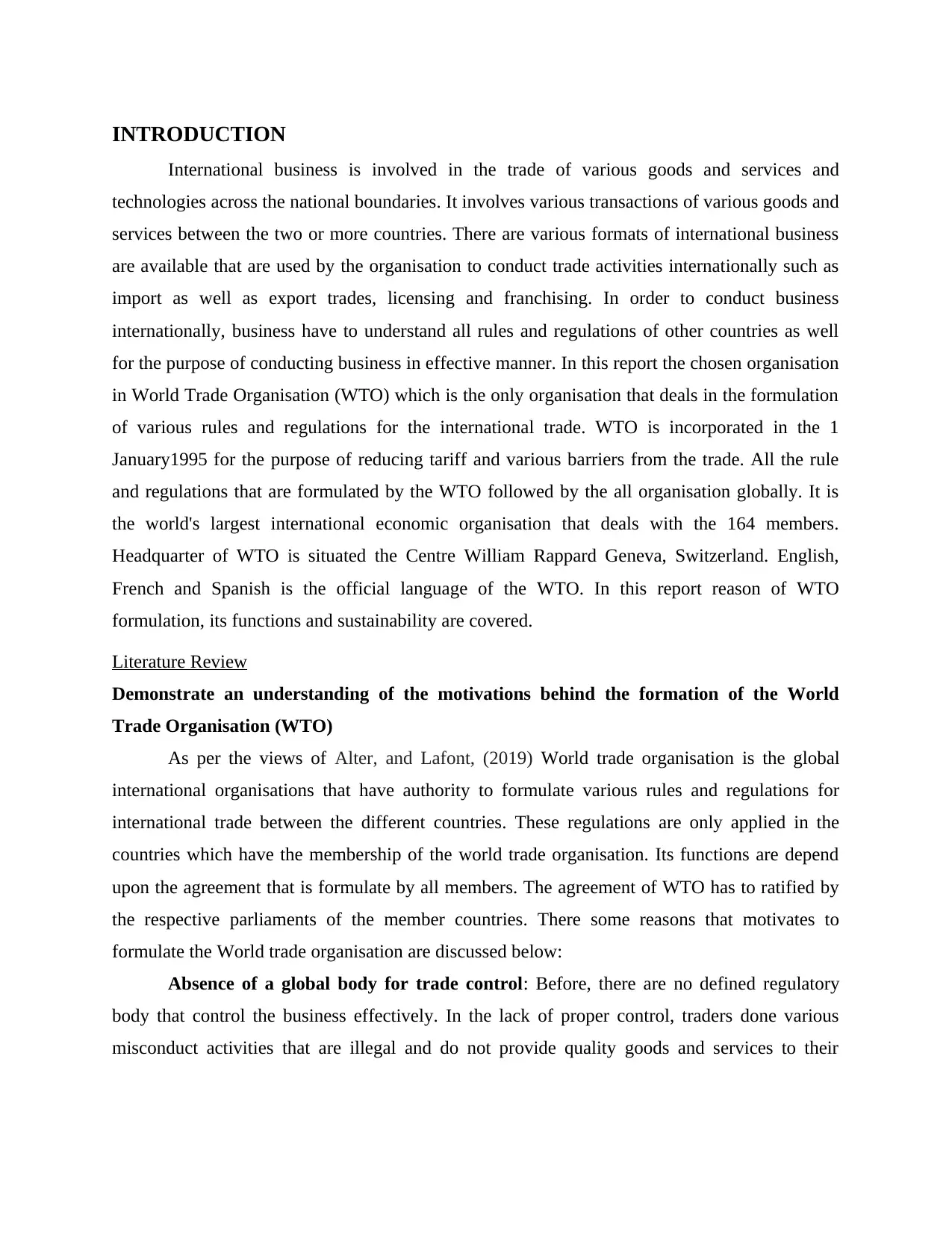
INTRODUCTION
International business is involved in the trade of various goods and services and
technologies across the national boundaries. It involves various transactions of various goods and
services between the two or more countries. There are various formats of international business
are available that are used by the organisation to conduct trade activities internationally such as
import as well as export trades, licensing and franchising. In order to conduct business
internationally, business have to understand all rules and regulations of other countries as well
for the purpose of conducting business in effective manner. In this report the chosen organisation
in World Trade Organisation (WTO) which is the only organisation that deals in the formulation
of various rules and regulations for the international trade. WTO is incorporated in the 1
January1995 for the purpose of reducing tariff and various barriers from the trade. All the rule
and regulations that are formulated by the WTO followed by the all organisation globally. It is
the world's largest international economic organisation that deals with the 164 members.
Headquarter of WTO is situated the Centre William Rappard Geneva, Switzerland. English,
French and Spanish is the official language of the WTO. In this report reason of WTO
formulation, its functions and sustainability are covered.
Literature Review
Demonstrate an understanding of the motivations behind the formation of the World
Trade Organisation (WTO)
As per the views of Alter, and Lafont, (2019) World trade organisation is the global
international organisations that have authority to formulate various rules and regulations for
international trade between the different countries. These regulations are only applied in the
countries which have the membership of the world trade organisation. Its functions are depend
upon the agreement that is formulate by all members. The agreement of WTO has to ratified by
the respective parliaments of the member countries. There some reasons that motivates to
formulate the World trade organisation are discussed below:
Absence of a global body for trade control: Before, there are no defined regulatory
body that control the business effectively. In the lack of proper control, traders done various
misconduct activities that are illegal and do not provide quality goods and services to their
International business is involved in the trade of various goods and services and
technologies across the national boundaries. It involves various transactions of various goods and
services between the two or more countries. There are various formats of international business
are available that are used by the organisation to conduct trade activities internationally such as
import as well as export trades, licensing and franchising. In order to conduct business
internationally, business have to understand all rules and regulations of other countries as well
for the purpose of conducting business in effective manner. In this report the chosen organisation
in World Trade Organisation (WTO) which is the only organisation that deals in the formulation
of various rules and regulations for the international trade. WTO is incorporated in the 1
January1995 for the purpose of reducing tariff and various barriers from the trade. All the rule
and regulations that are formulated by the WTO followed by the all organisation globally. It is
the world's largest international economic organisation that deals with the 164 members.
Headquarter of WTO is situated the Centre William Rappard Geneva, Switzerland. English,
French and Spanish is the official language of the WTO. In this report reason of WTO
formulation, its functions and sustainability are covered.
Literature Review
Demonstrate an understanding of the motivations behind the formation of the World
Trade Organisation (WTO)
As per the views of Alter, and Lafont, (2019) World trade organisation is the global
international organisations that have authority to formulate various rules and regulations for
international trade between the different countries. These regulations are only applied in the
countries which have the membership of the world trade organisation. Its functions are depend
upon the agreement that is formulate by all members. The agreement of WTO has to ratified by
the respective parliaments of the member countries. There some reasons that motivates to
formulate the World trade organisation are discussed below:
Absence of a global body for trade control: Before, there are no defined regulatory
body that control the business effectively. In the lack of proper control, traders done various
misconduct activities that are illegal and do not provide quality goods and services to their
Paraphrase This Document
Need a fresh take? Get an instant paraphrase of this document with our AI Paraphraser
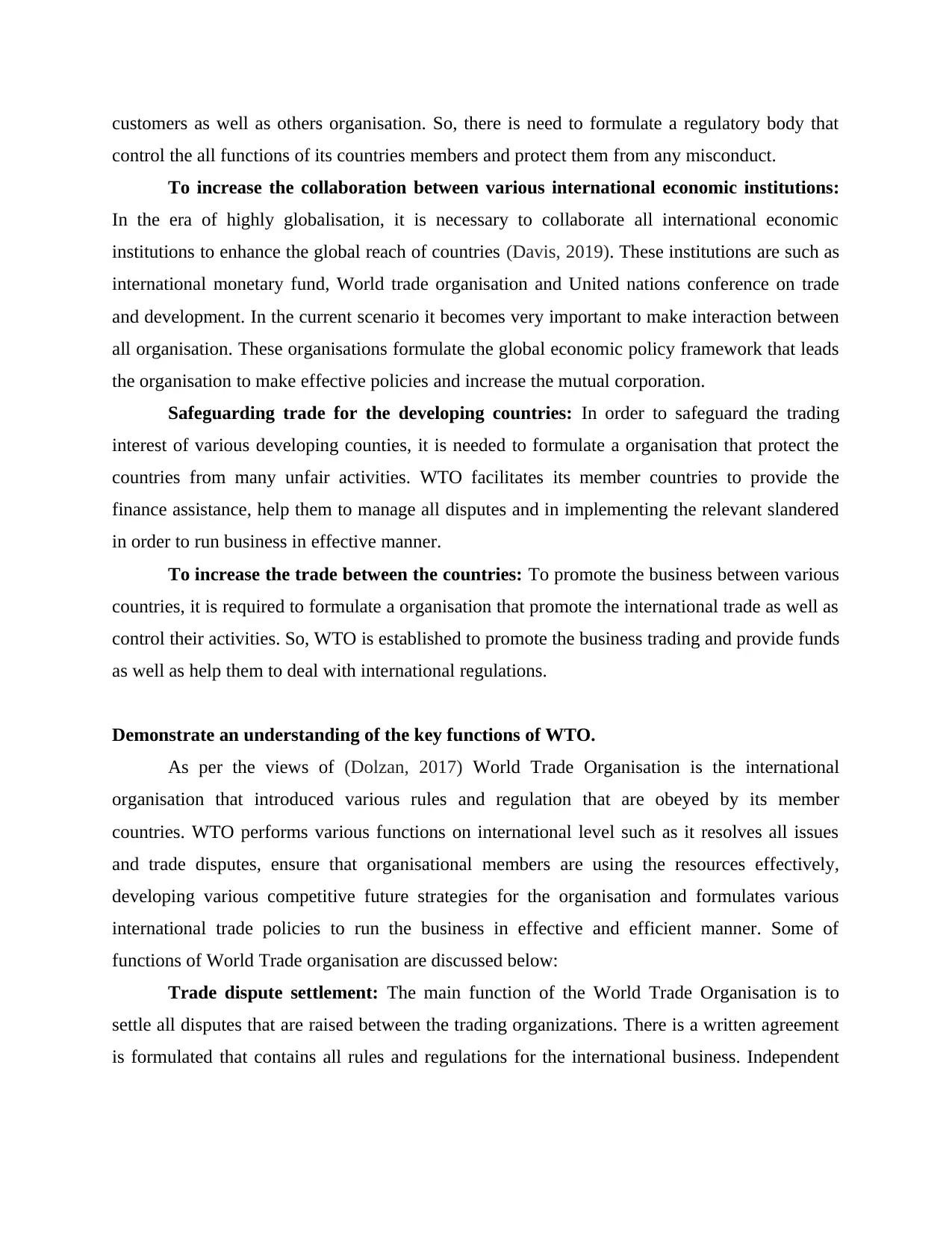
customers as well as others organisation. So, there is need to formulate a regulatory body that
control the all functions of its countries members and protect them from any misconduct.
To increase the collaboration between various international economic institutions:
In the era of highly globalisation, it is necessary to collaborate all international economic
institutions to enhance the global reach of countries (Davis, 2019). These institutions are such as
international monetary fund, World trade organisation and United nations conference on trade
and development. In the current scenario it becomes very important to make interaction between
all organisation. These organisations formulate the global economic policy framework that leads
the organisation to make effective policies and increase the mutual corporation.
Safeguarding trade for the developing countries: In order to safeguard the trading
interest of various developing counties, it is needed to formulate a organisation that protect the
countries from many unfair activities. WTO facilitates its member countries to provide the
finance assistance, help them to manage all disputes and in implementing the relevant slandered
in order to run business in effective manner.
To increase the trade between the countries: To promote the business between various
countries, it is required to formulate a organisation that promote the international trade as well as
control their activities. So, WTO is established to promote the business trading and provide funds
as well as help them to deal with international regulations.
Demonstrate an understanding of the key functions of WTO.
As per the views of (Dolzan, 2017) World Trade Organisation is the international
organisation that introduced various rules and regulation that are obeyed by its member
countries. WTO performs various functions on international level such as it resolves all issues
and trade disputes, ensure that organisational members are using the resources effectively,
developing various competitive future strategies for the organisation and formulates various
international trade policies to run the business in effective and efficient manner. Some of
functions of World Trade organisation are discussed below:
Trade dispute settlement: The main function of the World Trade Organisation is to
settle all disputes that are raised between the trading organizations. There is a written agreement
is formulated that contains all rules and regulations for the international business. Independent
control the all functions of its countries members and protect them from any misconduct.
To increase the collaboration between various international economic institutions:
In the era of highly globalisation, it is necessary to collaborate all international economic
institutions to enhance the global reach of countries (Davis, 2019). These institutions are such as
international monetary fund, World trade organisation and United nations conference on trade
and development. In the current scenario it becomes very important to make interaction between
all organisation. These organisations formulate the global economic policy framework that leads
the organisation to make effective policies and increase the mutual corporation.
Safeguarding trade for the developing countries: In order to safeguard the trading
interest of various developing counties, it is needed to formulate a organisation that protect the
countries from many unfair activities. WTO facilitates its member countries to provide the
finance assistance, help them to manage all disputes and in implementing the relevant slandered
in order to run business in effective manner.
To increase the trade between the countries: To promote the business between various
countries, it is required to formulate a organisation that promote the international trade as well as
control their activities. So, WTO is established to promote the business trading and provide funds
as well as help them to deal with international regulations.
Demonstrate an understanding of the key functions of WTO.
As per the views of (Dolzan, 2017) World Trade Organisation is the international
organisation that introduced various rules and regulation that are obeyed by its member
countries. WTO performs various functions on international level such as it resolves all issues
and trade disputes, ensure that organisational members are using the resources effectively,
developing various competitive future strategies for the organisation and formulates various
international trade policies to run the business in effective and efficient manner. Some of
functions of World Trade organisation are discussed below:
Trade dispute settlement: The main function of the World Trade Organisation is to
settle all disputes that are raised between the trading organizations. There is a written agreement
is formulated that contains all rules and regulations for the international business. Independent
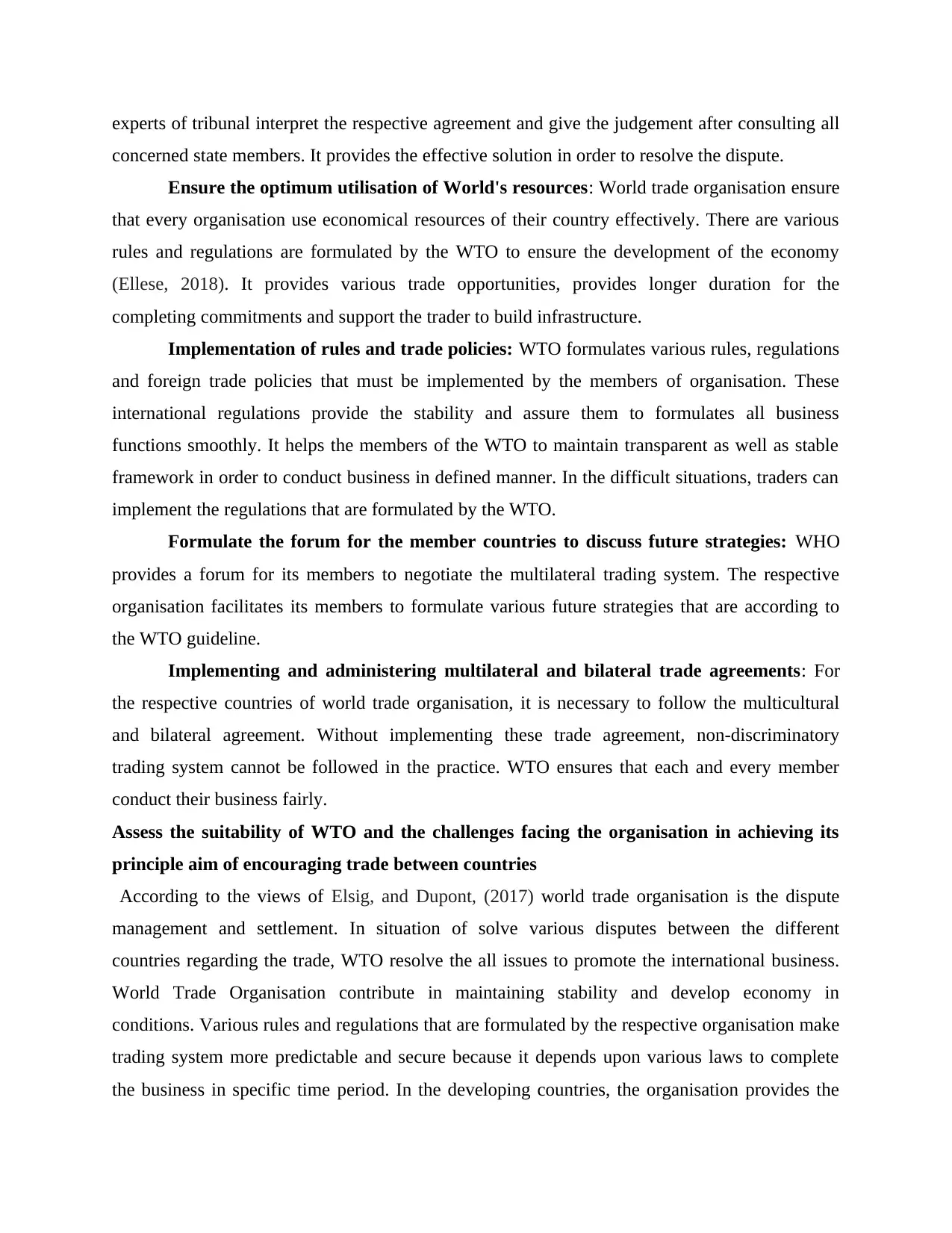
experts of tribunal interpret the respective agreement and give the judgement after consulting all
concerned state members. It provides the effective solution in order to resolve the dispute.
Ensure the optimum utilisation of World's resources: World trade organisation ensure
that every organisation use economical resources of their country effectively. There are various
rules and regulations are formulated by the WTO to ensure the development of the economy
(Ellese, 2018). It provides various trade opportunities, provides longer duration for the
completing commitments and support the trader to build infrastructure.
Implementation of rules and trade policies: WTO formulates various rules, regulations
and foreign trade policies that must be implemented by the members of organisation. These
international regulations provide the stability and assure them to formulates all business
functions smoothly. It helps the members of the WTO to maintain transparent as well as stable
framework in order to conduct business in defined manner. In the difficult situations, traders can
implement the regulations that are formulated by the WTO.
Formulate the forum for the member countries to discuss future strategies: WHO
provides a forum for its members to negotiate the multilateral trading system. The respective
organisation facilitates its members to formulate various future strategies that are according to
the WTO guideline.
Implementing and administering multilateral and bilateral trade agreements: For
the respective countries of world trade organisation, it is necessary to follow the multicultural
and bilateral agreement. Without implementing these trade agreement, non-discriminatory
trading system cannot be followed in the practice. WTO ensures that each and every member
conduct their business fairly.
Assess the suitability of WTO and the challenges facing the organisation in achieving its
principle aim of encouraging trade between countries
According to the views of Elsig, and Dupont, (2017) world trade organisation is the dispute
management and settlement. In situation of solve various disputes between the different
countries regarding the trade, WTO resolve the all issues to promote the international business.
World Trade Organisation contribute in maintaining stability and develop economy in
conditions. Various rules and regulations that are formulated by the respective organisation make
trading system more predictable and secure because it depends upon various laws to complete
the business in specific time period. In the developing countries, the organisation provides the
concerned state members. It provides the effective solution in order to resolve the dispute.
Ensure the optimum utilisation of World's resources: World trade organisation ensure
that every organisation use economical resources of their country effectively. There are various
rules and regulations are formulated by the WTO to ensure the development of the economy
(Ellese, 2018). It provides various trade opportunities, provides longer duration for the
completing commitments and support the trader to build infrastructure.
Implementation of rules and trade policies: WTO formulates various rules, regulations
and foreign trade policies that must be implemented by the members of organisation. These
international regulations provide the stability and assure them to formulates all business
functions smoothly. It helps the members of the WTO to maintain transparent as well as stable
framework in order to conduct business in defined manner. In the difficult situations, traders can
implement the regulations that are formulated by the WTO.
Formulate the forum for the member countries to discuss future strategies: WHO
provides a forum for its members to negotiate the multilateral trading system. The respective
organisation facilitates its members to formulate various future strategies that are according to
the WTO guideline.
Implementing and administering multilateral and bilateral trade agreements: For
the respective countries of world trade organisation, it is necessary to follow the multicultural
and bilateral agreement. Without implementing these trade agreement, non-discriminatory
trading system cannot be followed in the practice. WTO ensures that each and every member
conduct their business fairly.
Assess the suitability of WTO and the challenges facing the organisation in achieving its
principle aim of encouraging trade between countries
According to the views of Elsig, and Dupont, (2017) world trade organisation is the dispute
management and settlement. In situation of solve various disputes between the different
countries regarding the trade, WTO resolve the all issues to promote the international business.
World Trade Organisation contribute in maintaining stability and develop economy in
conditions. Various rules and regulations that are formulated by the respective organisation make
trading system more predictable and secure because it depends upon various laws to complete
the business in specific time period. In the developing countries, the organisation provides the
⊘ This is a preview!⊘
Do you want full access?
Subscribe today to unlock all pages.

Trusted by 1+ million students worldwide
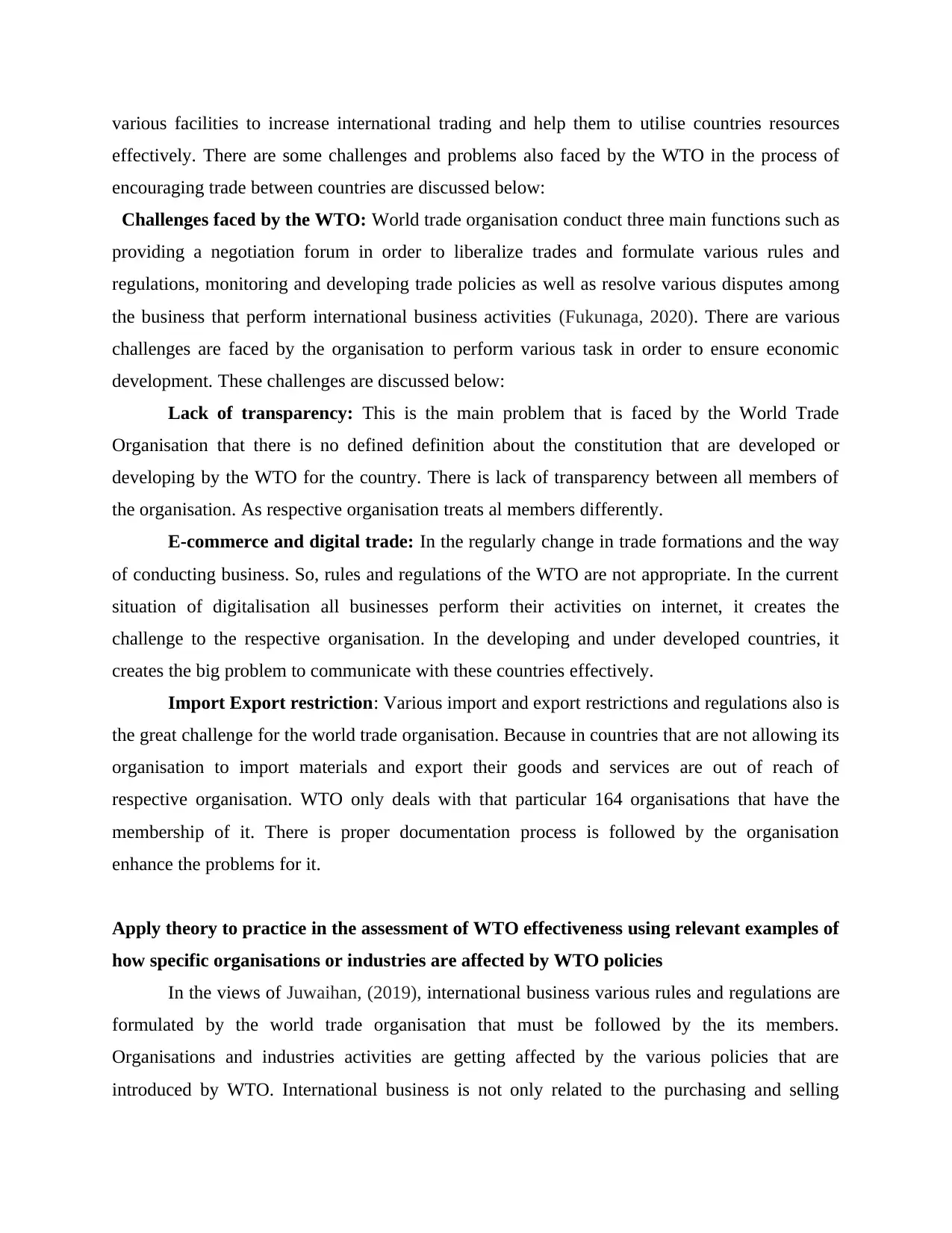
various facilities to increase international trading and help them to utilise countries resources
effectively. There are some challenges and problems also faced by the WTO in the process of
encouraging trade between countries are discussed below:
Challenges faced by the WTO: World trade organisation conduct three main functions such as
providing a negotiation forum in order to liberalize trades and formulate various rules and
regulations, monitoring and developing trade policies as well as resolve various disputes among
the business that perform international business activities (Fukunaga, 2020). There are various
challenges are faced by the organisation to perform various task in order to ensure economic
development. These challenges are discussed below:
Lack of transparency: This is the main problem that is faced by the World Trade
Organisation that there is no defined definition about the constitution that are developed or
developing by the WTO for the country. There is lack of transparency between all members of
the organisation. As respective organisation treats al members differently.
E-commerce and digital trade: In the regularly change in trade formations and the way
of conducting business. So, rules and regulations of the WTO are not appropriate. In the current
situation of digitalisation all businesses perform their activities on internet, it creates the
challenge to the respective organisation. In the developing and under developed countries, it
creates the big problem to communicate with these countries effectively.
Import Export restriction: Various import and export restrictions and regulations also is
the great challenge for the world trade organisation. Because in countries that are not allowing its
organisation to import materials and export their goods and services are out of reach of
respective organisation. WTO only deals with that particular 164 organisations that have the
membership of it. There is proper documentation process is followed by the organisation
enhance the problems for it.
Apply theory to practice in the assessment of WTO effectiveness using relevant examples of
how specific organisations or industries are affected by WTO policies
In the views of Juwaihan, (2019), international business various rules and regulations are
formulated by the world trade organisation that must be followed by the its members.
Organisations and industries activities are getting affected by the various policies that are
introduced by WTO. International business is not only related to the purchasing and selling
effectively. There are some challenges and problems also faced by the WTO in the process of
encouraging trade between countries are discussed below:
Challenges faced by the WTO: World trade organisation conduct three main functions such as
providing a negotiation forum in order to liberalize trades and formulate various rules and
regulations, monitoring and developing trade policies as well as resolve various disputes among
the business that perform international business activities (Fukunaga, 2020). There are various
challenges are faced by the organisation to perform various task in order to ensure economic
development. These challenges are discussed below:
Lack of transparency: This is the main problem that is faced by the World Trade
Organisation that there is no defined definition about the constitution that are developed or
developing by the WTO for the country. There is lack of transparency between all members of
the organisation. As respective organisation treats al members differently.
E-commerce and digital trade: In the regularly change in trade formations and the way
of conducting business. So, rules and regulations of the WTO are not appropriate. In the current
situation of digitalisation all businesses perform their activities on internet, it creates the
challenge to the respective organisation. In the developing and under developed countries, it
creates the big problem to communicate with these countries effectively.
Import Export restriction: Various import and export restrictions and regulations also is
the great challenge for the world trade organisation. Because in countries that are not allowing its
organisation to import materials and export their goods and services are out of reach of
respective organisation. WTO only deals with that particular 164 organisations that have the
membership of it. There is proper documentation process is followed by the organisation
enhance the problems for it.
Apply theory to practice in the assessment of WTO effectiveness using relevant examples of
how specific organisations or industries are affected by WTO policies
In the views of Juwaihan, (2019), international business various rules and regulations are
formulated by the world trade organisation that must be followed by the its members.
Organisations and industries activities are getting affected by the various policies that are
introduced by WTO. International business is not only related to the purchasing and selling
Paraphrase This Document
Need a fresh take? Get an instant paraphrase of this document with our AI Paraphraser
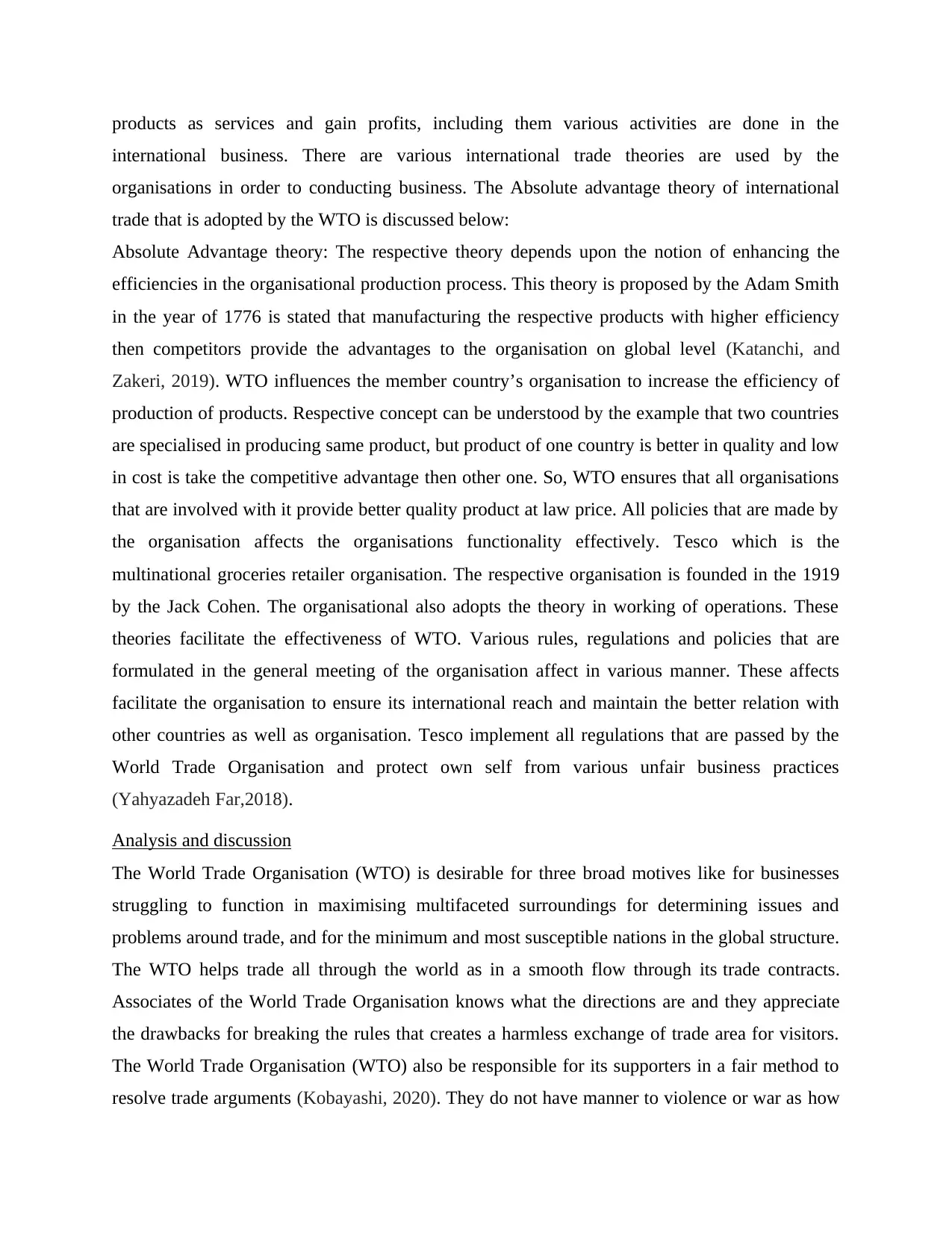
products as services and gain profits, including them various activities are done in the
international business. There are various international trade theories are used by the
organisations in order to conducting business. The Absolute advantage theory of international
trade that is adopted by the WTO is discussed below:
Absolute Advantage theory: The respective theory depends upon the notion of enhancing the
efficiencies in the organisational production process. This theory is proposed by the Adam Smith
in the year of 1776 is stated that manufacturing the respective products with higher efficiency
then competitors provide the advantages to the organisation on global level (Katanchi, and
Zakeri, 2019). WTO influences the member country’s organisation to increase the efficiency of
production of products. Respective concept can be understood by the example that two countries
are specialised in producing same product, but product of one country is better in quality and low
in cost is take the competitive advantage then other one. So, WTO ensures that all organisations
that are involved with it provide better quality product at law price. All policies that are made by
the organisation affects the organisations functionality effectively. Tesco which is the
multinational groceries retailer organisation. The respective organisation is founded in the 1919
by the Jack Cohen. The organisational also adopts the theory in working of operations. These
theories facilitate the effectiveness of WTO. Various rules, regulations and policies that are
formulated in the general meeting of the organisation affect in various manner. These affects
facilitate the organisation to ensure its international reach and maintain the better relation with
other countries as well as organisation. Tesco implement all regulations that are passed by the
World Trade Organisation and protect own self from various unfair business practices
(Yahyazadeh Far,2018).
Analysis and discussion
The World Trade Organisation (WTO) is desirable for three broad motives like for businesses
struggling to function in maximising multifaceted surroundings for determining issues and
problems around trade, and for the minimum and most susceptible nations in the global structure.
The WTO helps trade all through the world as in a smooth flow through its trade contracts.
Associates of the World Trade Organisation knows what the directions are and they appreciate
the drawbacks for breaking the rules that creates a harmless exchange of trade area for visitors.
The World Trade Organisation (WTO) also be responsible for its supporters in a fair method to
resolve trade arguments (Kobayashi, 2020). They do not have manner to violence or war as how
international business. There are various international trade theories are used by the
organisations in order to conducting business. The Absolute advantage theory of international
trade that is adopted by the WTO is discussed below:
Absolute Advantage theory: The respective theory depends upon the notion of enhancing the
efficiencies in the organisational production process. This theory is proposed by the Adam Smith
in the year of 1776 is stated that manufacturing the respective products with higher efficiency
then competitors provide the advantages to the organisation on global level (Katanchi, and
Zakeri, 2019). WTO influences the member country’s organisation to increase the efficiency of
production of products. Respective concept can be understood by the example that two countries
are specialised in producing same product, but product of one country is better in quality and low
in cost is take the competitive advantage then other one. So, WTO ensures that all organisations
that are involved with it provide better quality product at law price. All policies that are made by
the organisation affects the organisations functionality effectively. Tesco which is the
multinational groceries retailer organisation. The respective organisation is founded in the 1919
by the Jack Cohen. The organisational also adopts the theory in working of operations. These
theories facilitate the effectiveness of WTO. Various rules, regulations and policies that are
formulated in the general meeting of the organisation affect in various manner. These affects
facilitate the organisation to ensure its international reach and maintain the better relation with
other countries as well as organisation. Tesco implement all regulations that are passed by the
World Trade Organisation and protect own self from various unfair business practices
(Yahyazadeh Far,2018).
Analysis and discussion
The World Trade Organisation (WTO) is desirable for three broad motives like for businesses
struggling to function in maximising multifaceted surroundings for determining issues and
problems around trade, and for the minimum and most susceptible nations in the global structure.
The WTO helps trade all through the world as in a smooth flow through its trade contracts.
Associates of the World Trade Organisation knows what the directions are and they appreciate
the drawbacks for breaking the rules that creates a harmless exchange of trade area for visitors.
The World Trade Organisation (WTO) also be responsible for its supporters in a fair method to
resolve trade arguments (Kobayashi, 2020). They do not have manner to violence or war as how
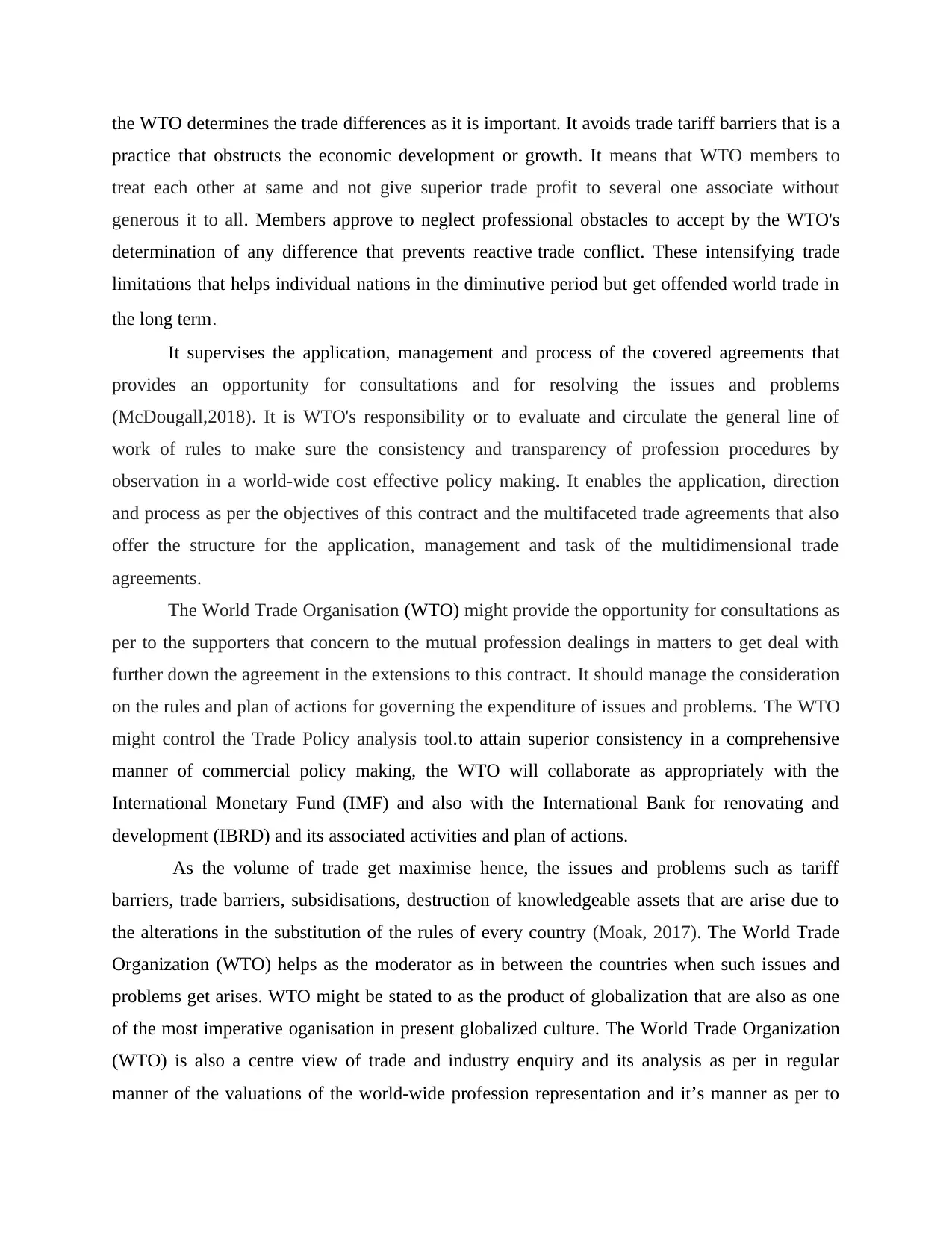
the WTO determines the trade differences as it is important. It avoids trade tariff barriers that is a
practice that obstructs the economic development or growth. It means that WTO members to
treat each other at same and not give superior trade profit to several one associate without
generous it to all. Members approve to neglect professional obstacles to accept by the WTO's
determination of any difference that prevents reactive trade conflict. These intensifying trade
limitations that helps individual nations in the diminutive period but get offended world trade in
the long term.
It supervises the application, management and process of the covered agreements that
provides an opportunity for consultations and for resolving the issues and problems
(McDougall,2018). It is WTO's responsibility or to evaluate and circulate the general line of
work of rules to make sure the consistency and transparency of profession procedures by
observation in a world-wide cost effective policy making. It enables the application, direction
and process as per the objectives of this contract and the multifaceted trade agreements that also
offer the structure for the application, management and task of the multidimensional trade
agreements.
The World Trade Organisation (WTO) might provide the opportunity for consultations as
per to the supporters that concern to the mutual profession dealings in matters to get deal with
further down the agreement in the extensions to this contract. It should manage the consideration
on the rules and plan of actions for governing the expenditure of issues and problems. The WTO
might control the Trade Policy analysis tool.to attain superior consistency in a comprehensive
manner of commercial policy making, the WTO will collaborate as appropriately with the
International Monetary Fund (IMF) and also with the International Bank for renovating and
development (IBRD) and its associated activities and plan of actions.
As the volume of trade get maximise hence, the issues and problems such as tariff
barriers, trade barriers, subsidisations, destruction of knowledgeable assets that are arise due to
the alterations in the substitution of the rules of every country (Moak, 2017). The World Trade
Organization (WTO) helps as the moderator as in between the countries when such issues and
problems get arises. WTO might be stated to as the product of globalization that are also as one
of the most imperative oganisation in present globalized culture. The World Trade Organization
(WTO) is also a centre view of trade and industry enquiry and its analysis as per in regular
manner of the valuations of the world-wide profession representation and it’s manner as per to
practice that obstructs the economic development or growth. It means that WTO members to
treat each other at same and not give superior trade profit to several one associate without
generous it to all. Members approve to neglect professional obstacles to accept by the WTO's
determination of any difference that prevents reactive trade conflict. These intensifying trade
limitations that helps individual nations in the diminutive period but get offended world trade in
the long term.
It supervises the application, management and process of the covered agreements that
provides an opportunity for consultations and for resolving the issues and problems
(McDougall,2018). It is WTO's responsibility or to evaluate and circulate the general line of
work of rules to make sure the consistency and transparency of profession procedures by
observation in a world-wide cost effective policy making. It enables the application, direction
and process as per the objectives of this contract and the multifaceted trade agreements that also
offer the structure for the application, management and task of the multidimensional trade
agreements.
The World Trade Organisation (WTO) might provide the opportunity for consultations as
per to the supporters that concern to the mutual profession dealings in matters to get deal with
further down the agreement in the extensions to this contract. It should manage the consideration
on the rules and plan of actions for governing the expenditure of issues and problems. The WTO
might control the Trade Policy analysis tool.to attain superior consistency in a comprehensive
manner of commercial policy making, the WTO will collaborate as appropriately with the
International Monetary Fund (IMF) and also with the International Bank for renovating and
development (IBRD) and its associated activities and plan of actions.
As the volume of trade get maximise hence, the issues and problems such as tariff
barriers, trade barriers, subsidisations, destruction of knowledgeable assets that are arise due to
the alterations in the substitution of the rules of every country (Moak, 2017). The World Trade
Organization (WTO) helps as the moderator as in between the countries when such issues and
problems get arises. WTO might be stated to as the product of globalization that are also as one
of the most imperative oganisation in present globalized culture. The World Trade Organization
(WTO) is also a centre view of trade and industry enquiry and its analysis as per in regular
manner of the valuations of the world-wide profession representation and it’s manner as per to
⊘ This is a preview!⊘
Do you want full access?
Subscribe today to unlock all pages.

Trusted by 1+ million students worldwide
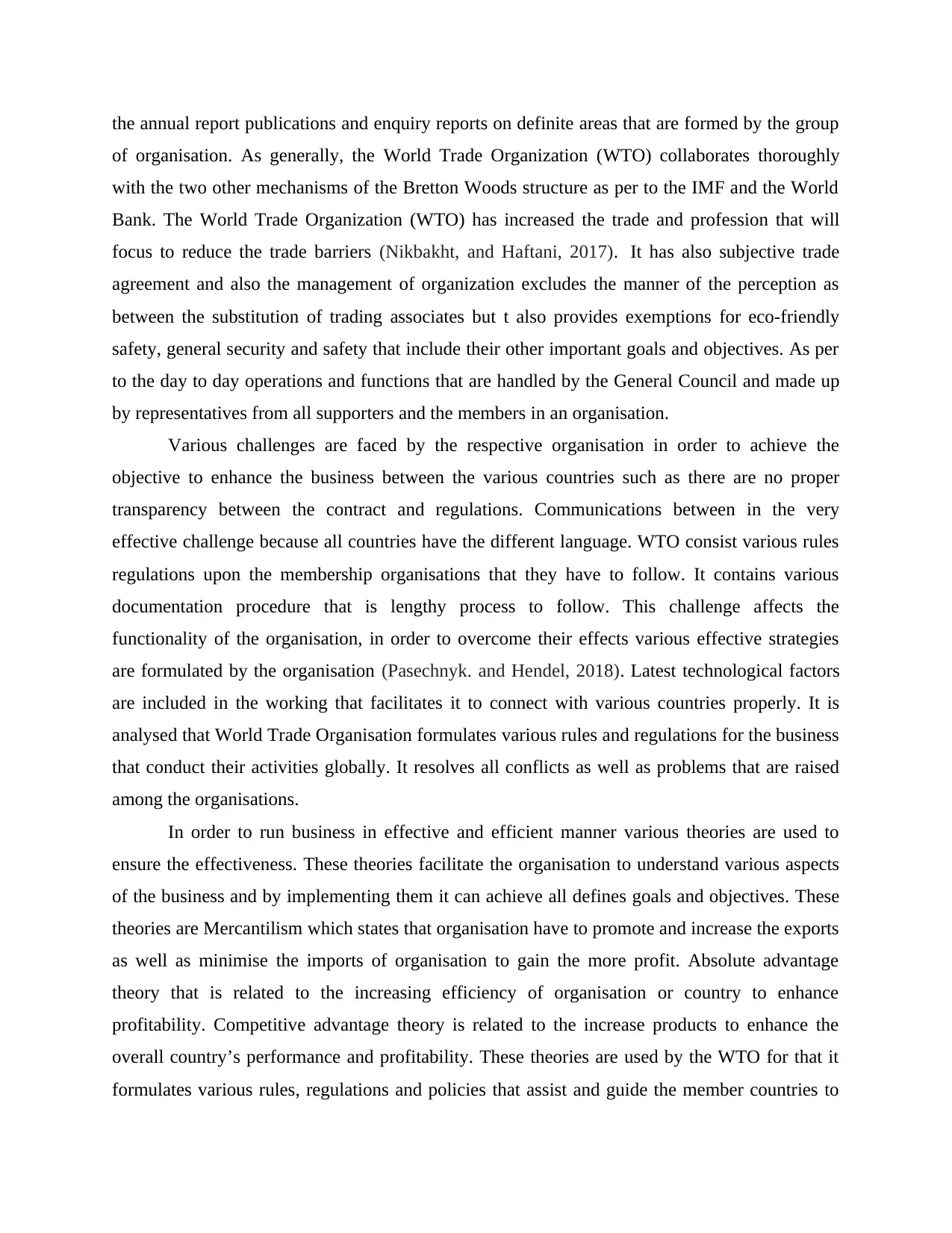
the annual report publications and enquiry reports on definite areas that are formed by the group
of organisation. As generally, the World Trade Organization (WTO) collaborates thoroughly
with the two other mechanisms of the Bretton Woods structure as per to the IMF and the World
Bank. The World Trade Organization (WTO) has increased the trade and profession that will
focus to reduce the trade barriers (Nikbakht, and Haftani, 2017). It has also subjective trade
agreement and also the management of organization excludes the manner of the perception as
between the substitution of trading associates but t also provides exemptions for eco-friendly
safety, general security and safety that include their other important goals and objectives. As per
to the day to day operations and functions that are handled by the General Council and made up
by representatives from all supporters and the members in an organisation.
Various challenges are faced by the respective organisation in order to achieve the
objective to enhance the business between the various countries such as there are no proper
transparency between the contract and regulations. Communications between in the very
effective challenge because all countries have the different language. WTO consist various rules
regulations upon the membership organisations that they have to follow. It contains various
documentation procedure that is lengthy process to follow. This challenge affects the
functionality of the organisation, in order to overcome their effects various effective strategies
are formulated by the organisation (Pasechnyk. and Hendel, 2018). Latest technological factors
are included in the working that facilitates it to connect with various countries properly. It is
analysed that World Trade Organisation formulates various rules and regulations for the business
that conduct their activities globally. It resolves all conflicts as well as problems that are raised
among the organisations.
In order to run business in effective and efficient manner various theories are used to
ensure the effectiveness. These theories facilitate the organisation to understand various aspects
of the business and by implementing them it can achieve all defines goals and objectives. These
theories are Mercantilism which states that organisation have to promote and increase the exports
as well as minimise the imports of organisation to gain the more profit. Absolute advantage
theory that is related to the increasing efficiency of organisation or country to enhance
profitability. Competitive advantage theory is related to the increase products to enhance the
overall country’s performance and profitability. These theories are used by the WTO for that it
formulates various rules, regulations and policies that assist and guide the member countries to
of organisation. As generally, the World Trade Organization (WTO) collaborates thoroughly
with the two other mechanisms of the Bretton Woods structure as per to the IMF and the World
Bank. The World Trade Organization (WTO) has increased the trade and profession that will
focus to reduce the trade barriers (Nikbakht, and Haftani, 2017). It has also subjective trade
agreement and also the management of organization excludes the manner of the perception as
between the substitution of trading associates but t also provides exemptions for eco-friendly
safety, general security and safety that include their other important goals and objectives. As per
to the day to day operations and functions that are handled by the General Council and made up
by representatives from all supporters and the members in an organisation.
Various challenges are faced by the respective organisation in order to achieve the
objective to enhance the business between the various countries such as there are no proper
transparency between the contract and regulations. Communications between in the very
effective challenge because all countries have the different language. WTO consist various rules
regulations upon the membership organisations that they have to follow. It contains various
documentation procedure that is lengthy process to follow. This challenge affects the
functionality of the organisation, in order to overcome their effects various effective strategies
are formulated by the organisation (Pasechnyk. and Hendel, 2018). Latest technological factors
are included in the working that facilitates it to connect with various countries properly. It is
analysed that World Trade Organisation formulates various rules and regulations for the business
that conduct their activities globally. It resolves all conflicts as well as problems that are raised
among the organisations.
In order to run business in effective and efficient manner various theories are used to
ensure the effectiveness. These theories facilitate the organisation to understand various aspects
of the business and by implementing them it can achieve all defines goals and objectives. These
theories are Mercantilism which states that organisation have to promote and increase the exports
as well as minimise the imports of organisation to gain the more profit. Absolute advantage
theory that is related to the increasing efficiency of organisation or country to enhance
profitability. Competitive advantage theory is related to the increase products to enhance the
overall country’s performance and profitability. These theories are used by the WTO for that it
formulates various rules, regulations and policies that assist and guide the member countries to
Paraphrase This Document
Need a fresh take? Get an instant paraphrase of this document with our AI Paraphraser
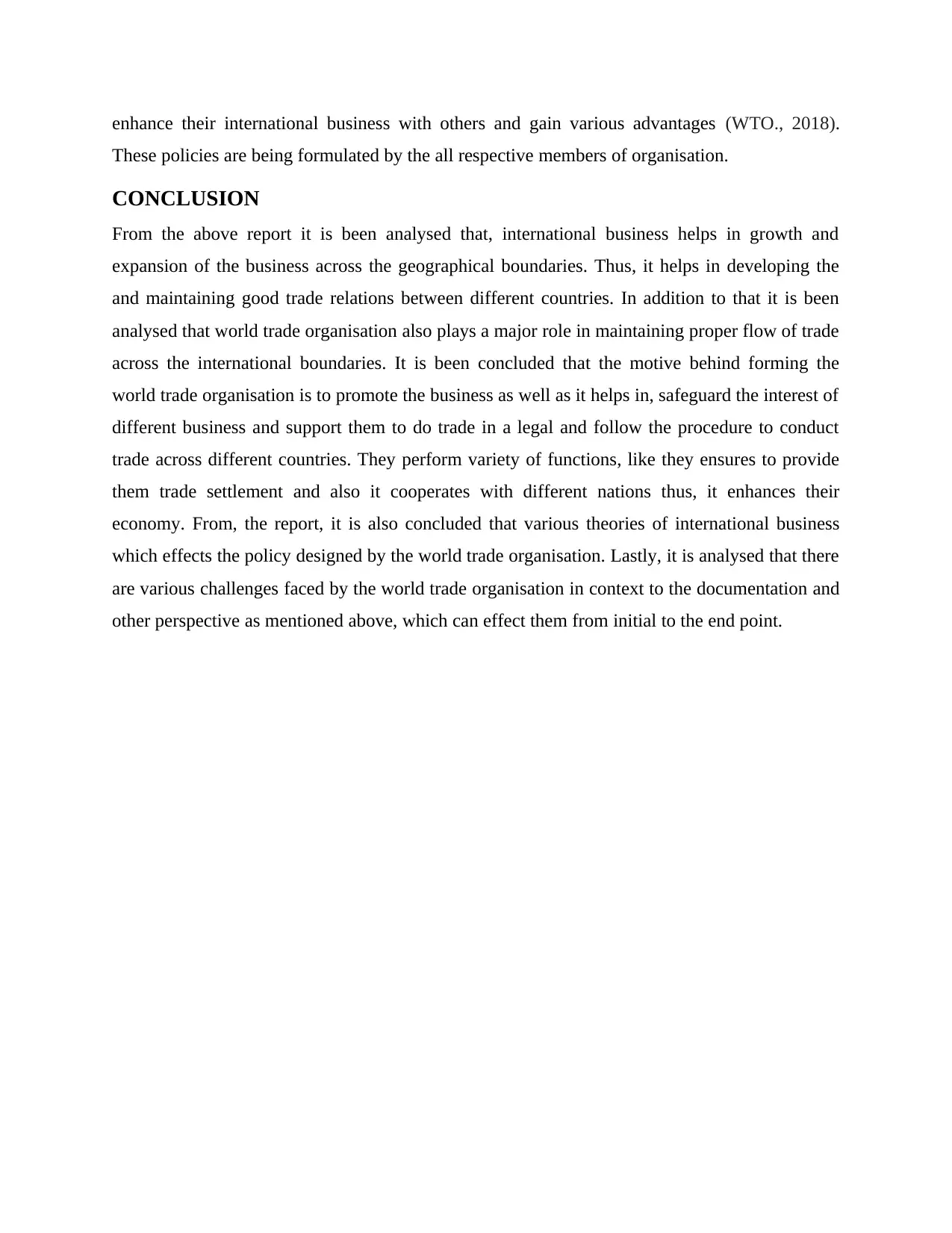
enhance their international business with others and gain various advantages (WTO., 2018).
These policies are being formulated by the all respective members of organisation.
CONCLUSION
From the above report it is been analysed that, international business helps in growth and
expansion of the business across the geographical boundaries. Thus, it helps in developing the
and maintaining good trade relations between different countries. In addition to that it is been
analysed that world trade organisation also plays a major role in maintaining proper flow of trade
across the international boundaries. It is been concluded that the motive behind forming the
world trade organisation is to promote the business as well as it helps in, safeguard the interest of
different business and support them to do trade in a legal and follow the procedure to conduct
trade across different countries. They perform variety of functions, like they ensures to provide
them trade settlement and also it cooperates with different nations thus, it enhances their
economy. From, the report, it is also concluded that various theories of international business
which effects the policy designed by the world trade organisation. Lastly, it is analysed that there
are various challenges faced by the world trade organisation in context to the documentation and
other perspective as mentioned above, which can effect them from initial to the end point.
These policies are being formulated by the all respective members of organisation.
CONCLUSION
From the above report it is been analysed that, international business helps in growth and
expansion of the business across the geographical boundaries. Thus, it helps in developing the
and maintaining good trade relations between different countries. In addition to that it is been
analysed that world trade organisation also plays a major role in maintaining proper flow of trade
across the international boundaries. It is been concluded that the motive behind forming the
world trade organisation is to promote the business as well as it helps in, safeguard the interest of
different business and support them to do trade in a legal and follow the procedure to conduct
trade across different countries. They perform variety of functions, like they ensures to provide
them trade settlement and also it cooperates with different nations thus, it enhances their
economy. From, the report, it is also concluded that various theories of international business
which effects the policy designed by the world trade organisation. Lastly, it is analysed that there
are various challenges faced by the world trade organisation in context to the documentation and
other perspective as mentioned above, which can effect them from initial to the end point.
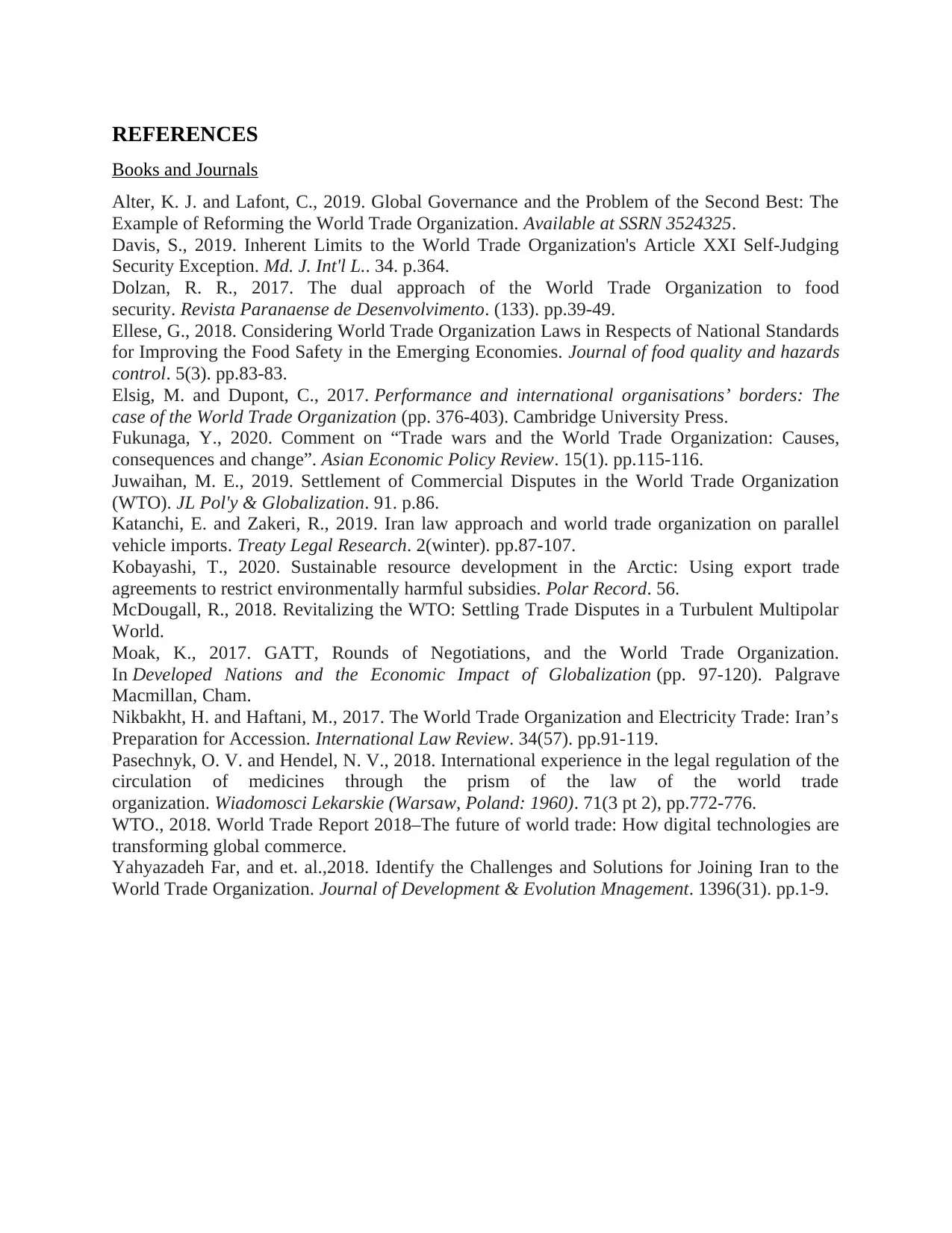
REFERENCES
Books and Journals
Alter, K. J. and Lafont, C., 2019. Global Governance and the Problem of the Second Best: The
Example of Reforming the World Trade Organization. Available at SSRN 3524325.
Davis, S., 2019. Inherent Limits to the World Trade Organization's Article XXI Self-Judging
Security Exception. Md. J. Int'l L.. 34. p.364.
Dolzan, R. R., 2017. The dual approach of the World Trade Organization to food
security. Revista Paranaense de Desenvolvimento. (133). pp.39-49.
Ellese, G., 2018. Considering World Trade Organization Laws in Respects of National Standards
for Improving the Food Safety in the Emerging Economies. Journal of food quality and hazards
control. 5(3). pp.83-83.
Elsig, M. and Dupont, C., 2017. Performance and international organisations’ borders: The
case of the World Trade Organization (pp. 376-403). Cambridge University Press.
Fukunaga, Y., 2020. Comment on “Trade wars and the World Trade Organization: Causes,
consequences and change”. Asian Economic Policy Review. 15(1). pp.115-116.
Juwaihan, M. E., 2019. Settlement of Commercial Disputes in the World Trade Organization
(WTO). JL Pol'y & Globalization. 91. p.86.
Katanchi, E. and Zakeri, R., 2019. Iran law approach and world trade organization on parallel
vehicle imports. Treaty Legal Research. 2(winter). pp.87-107.
Kobayashi, T., 2020. Sustainable resource development in the Arctic: Using export trade
agreements to restrict environmentally harmful subsidies. Polar Record. 56.
McDougall, R., 2018. Revitalizing the WTO: Settling Trade Disputes in a Turbulent Multipolar
World.
Moak, K., 2017. GATT, Rounds of Negotiations, and the World Trade Organization.
In Developed Nations and the Economic Impact of Globalization (pp. 97-120). Palgrave
Macmillan, Cham.
Nikbakht, H. and Haftani, M., 2017. The World Trade Organization and Electricity Trade: Iran’s
Preparation for Accession. International Law Review. 34(57). pp.91-119.
Pasechnyk, O. V. and Hendel, N. V., 2018. International experience in the legal regulation of the
circulation of medicines through the prism of the law of the world trade
organization. Wiadomosci Lekarskie (Warsaw, Poland: 1960). 71(3 pt 2), pp.772-776.
WTO., 2018. World Trade Report 2018–The future of world trade: How digital technologies are
transforming global commerce.
Yahyazadeh Far, and et. al.,2018. Identify the Challenges and Solutions for Joining Iran to the
World Trade Organization. Journal of Development & Evolution Mnagement. 1396(31). pp.1-9.
Books and Journals
Alter, K. J. and Lafont, C., 2019. Global Governance and the Problem of the Second Best: The
Example of Reforming the World Trade Organization. Available at SSRN 3524325.
Davis, S., 2019. Inherent Limits to the World Trade Organization's Article XXI Self-Judging
Security Exception. Md. J. Int'l L.. 34. p.364.
Dolzan, R. R., 2017. The dual approach of the World Trade Organization to food
security. Revista Paranaense de Desenvolvimento. (133). pp.39-49.
Ellese, G., 2018. Considering World Trade Organization Laws in Respects of National Standards
for Improving the Food Safety in the Emerging Economies. Journal of food quality and hazards
control. 5(3). pp.83-83.
Elsig, M. and Dupont, C., 2017. Performance and international organisations’ borders: The
case of the World Trade Organization (pp. 376-403). Cambridge University Press.
Fukunaga, Y., 2020. Comment on “Trade wars and the World Trade Organization: Causes,
consequences and change”. Asian Economic Policy Review. 15(1). pp.115-116.
Juwaihan, M. E., 2019. Settlement of Commercial Disputes in the World Trade Organization
(WTO). JL Pol'y & Globalization. 91. p.86.
Katanchi, E. and Zakeri, R., 2019. Iran law approach and world trade organization on parallel
vehicle imports. Treaty Legal Research. 2(winter). pp.87-107.
Kobayashi, T., 2020. Sustainable resource development in the Arctic: Using export trade
agreements to restrict environmentally harmful subsidies. Polar Record. 56.
McDougall, R., 2018. Revitalizing the WTO: Settling Trade Disputes in a Turbulent Multipolar
World.
Moak, K., 2017. GATT, Rounds of Negotiations, and the World Trade Organization.
In Developed Nations and the Economic Impact of Globalization (pp. 97-120). Palgrave
Macmillan, Cham.
Nikbakht, H. and Haftani, M., 2017. The World Trade Organization and Electricity Trade: Iran’s
Preparation for Accession. International Law Review. 34(57). pp.91-119.
Pasechnyk, O. V. and Hendel, N. V., 2018. International experience in the legal regulation of the
circulation of medicines through the prism of the law of the world trade
organization. Wiadomosci Lekarskie (Warsaw, Poland: 1960). 71(3 pt 2), pp.772-776.
WTO., 2018. World Trade Report 2018–The future of world trade: How digital technologies are
transforming global commerce.
Yahyazadeh Far, and et. al.,2018. Identify the Challenges and Solutions for Joining Iran to the
World Trade Organization. Journal of Development & Evolution Mnagement. 1396(31). pp.1-9.
⊘ This is a preview!⊘
Do you want full access?
Subscribe today to unlock all pages.

Trusted by 1+ million students worldwide
1 out of 14
Related Documents
Your All-in-One AI-Powered Toolkit for Academic Success.
+13062052269
info@desklib.com
Available 24*7 on WhatsApp / Email
![[object Object]](/_next/static/media/star-bottom.7253800d.svg)
Unlock your academic potential
Copyright © 2020–2026 A2Z Services. All Rights Reserved. Developed and managed by ZUCOL.





